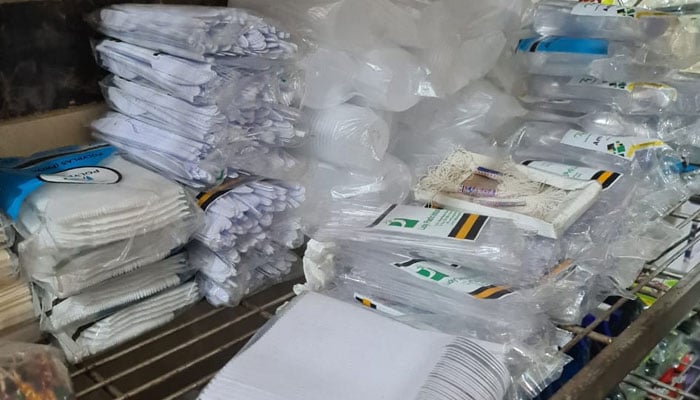1,985 kilograms confiscated plastic bags converted into green benches, planters
Islamabad : The Pakistan Environmental Protection Agency (Pak-EPA) has successfully converted around 1985 kilogrammes of confiscated banned single-use polythene bags into green benches and planters in its effort to contain maximum damage to the environment and nature.
Director General, Pak-EPA, Farzana Altaf Shah flanked by Director Labs and National Environmentally Quality Standards (NEQS), EPA, Dr Zaigham Abbas held a joint media briefing intended to apprise the environmental journalists on the promising development of the environmental watchdog transforming plastic prohibition into a win-win opportunity for the consumers and industries.
DG Farzana Altaf Shah said plastics had catastrophic effects on human health, environment and endanger marine life.
"Plastic pollution has become more visible both on land and in waterways around the world.
Annually 459.75 Million tons plastic is produced globally.
Till 2019 accumulatively 9.5 Billion Tons plastic has been produced. Annually 350 Million Tons of waste is generated globally, out of which, 35% from single-use plastics.
Pakistan alone produces 3.3 Million Tons of plastic waste that is equivalent to height of two K2 mountains.
The crisis prompted 175 nations to adopt a resolution at UNEA in 2022 to develop an international legally binding instrument to end plastic pollution from source to sea by 2024," she said.
She added that as a first step, Pak EPA imposed a complete ban on polythene bags (manufacture, import, sale, purchase, storage and usage) in Islamabad Capital Territory (ICT) under Polythene Bags Regulations on 14th August 2019 to effectively address the plastic issues particularly excessive use of single-use polythene bags in the country.
Afterwards, she said Pak EPA initiated an exhaustive consultative process with the line Ministries, provincial environment departments, ICT administration, industries and other relevant stakeholders for developing Single-Use Plastics (Prohibition) Regulations, 2023 as well as restriction on use of Polyethylene Terephthalate (PET) bottles in Federal Ministries/Divisions.
The aim of Single-Use Plastics (Prohibition) Regulations 2023 is to fight littering and prevent carcinogenic and problematic plastic items from entering the market to achieve the following objectives: Reduce adverse impacts on human health and environment, Transition to a circular economy , Make solid waste systems more efficient by reducing burden ,Shifting responsibility of waste collection on polluters Encourage engagement of private sector and community in combating plastic pollution, she added.
Director (Lab/NEQS), Pak EPA, Dr.
Zaigham Abbas said all types of plastics are made from petroleum monomers like polyethylene (PE), polypropylene (PP), polystyrene (PS).
Enforcement teams of Pak EPA confiscated 1985 Kgs of polythene bags from the violators of the Regulations in Islamabad Capital Territory (ICT).
These confiscated bags are converted into four Green Benches and four Green Planters by using environment friendly technology.
This initiative of Pak EPA is a first step into circular economy of plastic waste.
Pak EPA will disseminate these Green Benches and Green Planters in public offices, universities, colleges, schools, markets, parks.
He underlined the salient features of Single-Use Plastics (Prohibition) Regulations 2023 stating that due to lack of alternatives and need for transition to a circular economy, single-use plastic beverage containers shall contain at least 50% recycled plastic from 1st July 2028, based on polluter pays principle plastic waste may be collected by producers, importers and beverage companies, record keeping and disclosure of data by producers and importers of single-use plastics, whereas producers, importers, distributors, suppliers and beverage companies may be directed to initiate awareness campaigns and for enforcement of these Regulations, fines may be imposed by the Pakistan Environmental Protection Agency for violations.
-
 'Elderly' Nanny Arrested By ICE Outside Employer's Home, Freed After Judge's Order
'Elderly' Nanny Arrested By ICE Outside Employer's Home, Freed After Judge's Order -
 Keke Palmer On Managing Growing Career With 2-year-old Son: 'It's A Lot'
Keke Palmer On Managing Growing Career With 2-year-old Son: 'It's A Lot' -
 Key Details From Germany's Multimillion-euro Heist Revealed
Key Details From Germany's Multimillion-euro Heist Revealed -
 David E. Kelley Breaks Vow To Cast Wife Michelle Pfeiffer In 'Margo's Got Money Troubles'
David E. Kelley Breaks Vow To Cast Wife Michelle Pfeiffer In 'Margo's Got Money Troubles' -
 AI-powered Police Robots To Fight Crime By 2028: Report
AI-powered Police Robots To Fight Crime By 2028: Report -
 Everything We Know About Jessie J's Breast Cancer Journey
Everything We Know About Jessie J's Breast Cancer Journey -
 Winter Olympics 2026: What To Watch In Men’s Hockey Today
Winter Olympics 2026: What To Watch In Men’s Hockey Today -
 Winnie Harlow Breaks Vitiligo Stereotypes: 'I'm Not A Sufferer'
Winnie Harlow Breaks Vitiligo Stereotypes: 'I'm Not A Sufferer' -
 Apple Martin Opens Up About Getting 'crazy' Lip Filler
Apple Martin Opens Up About Getting 'crazy' Lip Filler -
 Why Did OpenAI Remove One Crucial Word From Its Mission Statement?
Why Did OpenAI Remove One Crucial Word From Its Mission Statement? -
 Prince William Warned His Future Reign Will Be Affected By Andrew Scandal
Prince William Warned His Future Reign Will Be Affected By Andrew Scandal -
 Amy Madigan Reflects On Husband Ed Harris' Support After Oscar Nomination
Amy Madigan Reflects On Husband Ed Harris' Support After Oscar Nomination -
 Is Studying Medicine Useless? Elon Musk’s Claim That AI Will Outperform Surgeons Sparks Debate
Is Studying Medicine Useless? Elon Musk’s Claim That AI Will Outperform Surgeons Sparks Debate -
 Margot Robbie Gushes Over 'Wuthering Heights' Director: 'I'd Follow Her Anywhere'
Margot Robbie Gushes Over 'Wuthering Heights' Director: 'I'd Follow Her Anywhere' -
 'The Muppet Show' Star Miss Piggy Gives Fans THIS Advice
'The Muppet Show' Star Miss Piggy Gives Fans THIS Advice -
 Sarah Ferguson Concerned For Princess Eugenie, Beatrice Amid Epstein Scandal
Sarah Ferguson Concerned For Princess Eugenie, Beatrice Amid Epstein Scandal




